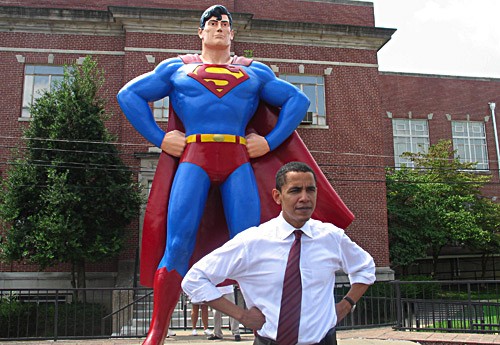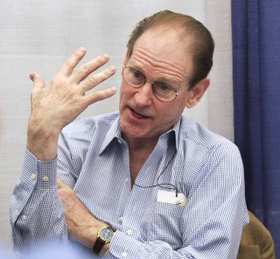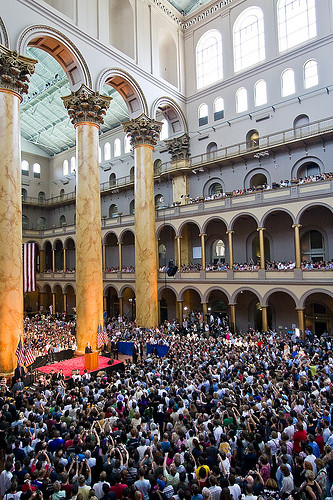The Huffington Post, 6-4-09
Now that President Obama has settled into the job enough to give Brian Williams a backstage pass to the West Wing, the heat of last year's campaign has faded. Especially with Secretary of State Clinton at his side as they tour Egypt to help repair U.S.-Arab relations, the significance of June 4th to Obama's rise may have diminished.

But it was one year ago today that Hillary Clinton
announced plans to suspend her campaign for the Democratic nomination, and urged her supporters to unite behind Barack Obama. It was an overdue end to a seemingly endless primary campaign. And a surprising one, considering that until actual primary voters weighed in, the nomination had appeared to be Clinton's for the taking.
 Bill and Hillary at New York rally, June 3, 2008
Bill and Hillary at New York rally, June 3, 2008She had money, momentum, and crucial to the Democratic nominating process, Clinton had a
big lead in superdelegate support. The
rules said these Democratic elected officials and other party leaders could choose to back whomever they wanted, regardless of how their states or districts voted.
One of the unanswered questions from the primary campaign was why more superdelegates didn't endorse Clinton over Obama, even though they were
party insiders, and she was the insider candidate. Plus, the conventional wisdom was that Hillary might be a stronger general election pick.
After Obama battled Clinton
to a standstill on Super Tuesday, parts of the Democratic establishment were open-mouthed in disbelief. For the next three months, the Clinton campaign did its best to fan doubts about Obama's electability. They were helped as controversies involving the Rev. Jeremiah Wright and Obama’s "bitter" comments swirled around his candidacy. Clinton won crucial states like Ohio and Pennsylvania, largely by rebranding herself as a "fighter" and tailoring her message to older, white, working class Democrats.
(In hindsight of Obama's
resounding victory over John McCain in the fall, the conventional wisdom was dead wrong. If Hillary had ended up as the nominee, many disillusioned Obama voters would have stayed home. McCain would never have picked Sarah Palin as his VP, instead going with his
gut instinct to choose someone far less politically radioactive, like Minnesota Gov. Tim Pawlenty or former Pennsylvania Gov. Tom Ridge.)
Yet Obama kept getting a steady trickle of superdelegate endorsements. In mid-February, Clinton was backed by 100 more supers than Obama, but her advantage gradually shrank. On May 9, various news organizations reported Obama had overtaken Clinton in the superdelegate chase. The final tally as of June 4 was 389 superdelegates for Obama versus 282 for Clinton.

Interviewed for the
New York Times' official post-mortem on Hillary’s campaign, Pennsylvania superdelegate Jason Altmire
explained the "frustration" within Hillaryland, since "they kept winning state after state and they expected others [superdelegates] to start turning their way and it just didn’t happen."
So what happened? Harold Ickes would surely like to know. In addition to being a divisive presence in Hillary's inner circle, the legendarily hot-tempered Democratic operative was
in charge of the Clinton superdelegate operation.

Certainly, some superdelegates saw the writing on the wall. They recognized Barack Obama was both the Democratic Party's future and the strongest candidate against McCain, and endorsed accordingly. Some were reluctant to fight past battles and ready for the party to embrace new leadership. All had
personal reasons for their choices.
As a blogger and activist who campaigned for superdelegates to support Obama over Clinton, I had a window on the behind-the-scenes maneuvering going on largely out of view of the press and the campaigns themselves. There was a secret war being waged by both Obama and Clinton supporters to convince individual superdelegates to endorse their preferred candidates.
The Clinton campaign, in an all-out struggle to prevent the nomination from slipping away, was very public about its strategy. They openly encouraged their supporters, particularly big money donors, to pester and cajole superdelegates on Clinton’s behalf, unconcerned that heavy-handed lobbying might turn off the very superdelegates they were trying to influence.
But they were beaten to the punch by Obama supporters, who organized spontaneously, and used the power of the internet to shine light on who the superdelegates were and how ordinary citizens could contact them. None of this was encouraged by the Obama campaign, who had their own, internal strategy to woo the supers. Barack and Michelle began personally calling superdelegates
as early as March 2007, something Hillary agreed to do
only after the Texas and Ohio contests on March 4. Although Team Obama
eventually decided a little citizen lobbying might not be such a bad thing. Yet throughout the primaries, lobbying was happening fast and furiously at the grassroots and netroots levels.
While careful to remain neutral,
Democratic Convention Watch was essential for anyone tracking superdelegates. A no frills, Blogger-hosted site run by two Denver political junkies, DemConWatch became the most
trusted source for news about superdelegate endorsements,
more accurate and up-to-date than any brand name media outlet.
The
Superdelegate Transparency Project was another independent, neutral resource. A joint project of
LiteraryOutpost,
OpenLeft, DemConWatch, and HuffPo’s
Off the Bus, organizer Jennifer Nix
described the effort as a "collaborative project among all interested parties to bring transparency and accountability to the Democratic National Convention." They posted state-by-state breakdowns of which superdelegates had endorsed which candidates, what popular vote totals each had received, and whether the supers’ endorsements lined up with the votes in their respective districts.
Obama supporters on MyBarackObama.com and sites like DailyKos and Democratic Underground were constantly circulating lists of uncommitted superdelegates. In mid-February, MoveOn.org jumped into the fray when it began an
online petition drive that 400,000 signed, calling for superdelegates to "let the voters decide between Clinton and Obama, then support the people’s choice." The San Francisco-based group Color Of Change
delivered 25,000 e-mails urging Congressional Black Caucus members to follow their districts' votes.
In North Carolina, our congressional superdelegates originally backed former Sen. John Edwards. When Edwards exited the race in late January, most had yet to endorse another candidate.
So a few Obama supporters in N.C. decided to lobby them and
organized Voters for Obama. Our website,
votersforobama.org, launched on President's Day (Feb. 19). Using info gathered by DemConWatch and STP, we posted state-by-state lists of supers, their endorsements, and going a crucial step further, included contact info (work mailing addresses, e-mails, and phone numbers) for selected superdelegates. We provided simple instructions on how to make polite, respectful phone calls or send e-mails asking superdelegates to support Obama.

Over the next few months, 15,000 people visited our site, and we helped voters from around the country generate an estimated several thousand e-mails and phone calls to superdelegates. Volunteers gathered thousands more signatures on petitions in seven states including North Carolina.

And together with similar efforts by other Obama supporters, it made a difference. Most superdelegates are politicians, and they pay attention to the voters who elect them. Cincinnati Mayor Mark Mallory announced his support for Obama on Feb. 25 as a superdelegate from Ohio. Following a news story about his previous indecision, Mallory
said he heard from many community members. "[I] got lots of calls and e-mails, mostly telling me to support Obama," he said. "I got three or four calls in support of Clinton, but it was very lopsided."
In mid-Feburary, approximately 400 superdelegates
remained uncommitted. We targeted half of them, mostly elected officials and state Democratic party leaders, who we thought would be the most responsive to their constituents and rank-and-file Democrats in each state. Of the 205 superdelegates we posted contact info for, 130 of them (63%) endorsed Obama during the three and a half months leading up to June 4, when Hillary announced her intention to suspend campaigning. 56 superdelegates that we lobbied (27%) remained neutral, while only 19 (or 9%) came out for Hillary. Our target superdelegates delivered an 111-delegate net gain for Obama.
 Superdelegate endorsement graph courtesy of DemConWatch
Superdelegate endorsement graph courtesy of DemConWatchBelatedly, the Clinton campaign set up their own online lobbying operation, including slick, interactive websites. But whoever was running the show was decidedly not slick enough to realize the dangers of providing contact info for all the supers, including those who had already endorsed Hillary. Ditto for posting personal cell phone numbers and e-mail addresses.
NObama Democrats backing Hillary were late to the game, but they made up for it with frenzied enthusiasm once they got going.
Taylor Marsh harangued her listeners to lobby superdelegates for Hillary, and sites like JustSayNoDeal.com and PUMAPAC.org (Party Unity My Ass) were hot on the bandwagon.
A project called
LobbyDelegates.com also launched, and although officially neutral, became the
go-to site for disgruntled Clintonistas. Three of the top five URLs directing traffic to LobbyDelegates.com were official Clinton websites, and a fourth was a site affiliated with PUMA PAC.
By late May, Obama's high profile supporters were anxious to get the nomination fight settled. Perhaps fed up with the efforts of Hillary dead-enders to keep dividing the party, on May 22 Arianna Huffington
called for superdelegates to endorse Obama, and encouraged her readers to contact and lobby them.
In the end, enough superdelegates swung behind Obama to allow pledged delegates from the final primaries to put him over the top. Obama reached a majority of 2,118 delegates on the night of June 3, after voters in Montana cast their ballots in the 54th nominating contest of the season. The next day, Democratic members of Congress who had remained Clinton supporters up until that point
urged her to withdraw, and she announced she would. Hillary delivered her concession speech three days later on June 7th, at a final event packed with her supporters.

A year later, I would like to thank all our Voters for Obama
coalition members, volunteers, and supporters. Special thanks go out to co-organizers M.L. Dexter, who did most of the superdelegate research necessary to first set up our site, and Dana Lumsden, for his enthusiasm and unwavering support; SuperVoters
Susan Baylies and Scott Priz, for being willing to put on capes for Obama and help deliver 2,000 signed petitions to N.C. Gov. Mike Easley; and local organizer Cristobal Palmer, whose
tireless efforts helped make our N.C. petition drive a success.
And a big thanks to everyone who visited
votersforobama.org and used its tools to call, e-mail, or sign a petition to superdelegates for Obama. We let our party leaders know their constituents wanted Obama to be the Democratic presidential nominee in 2008, and they listened.






![]()














































